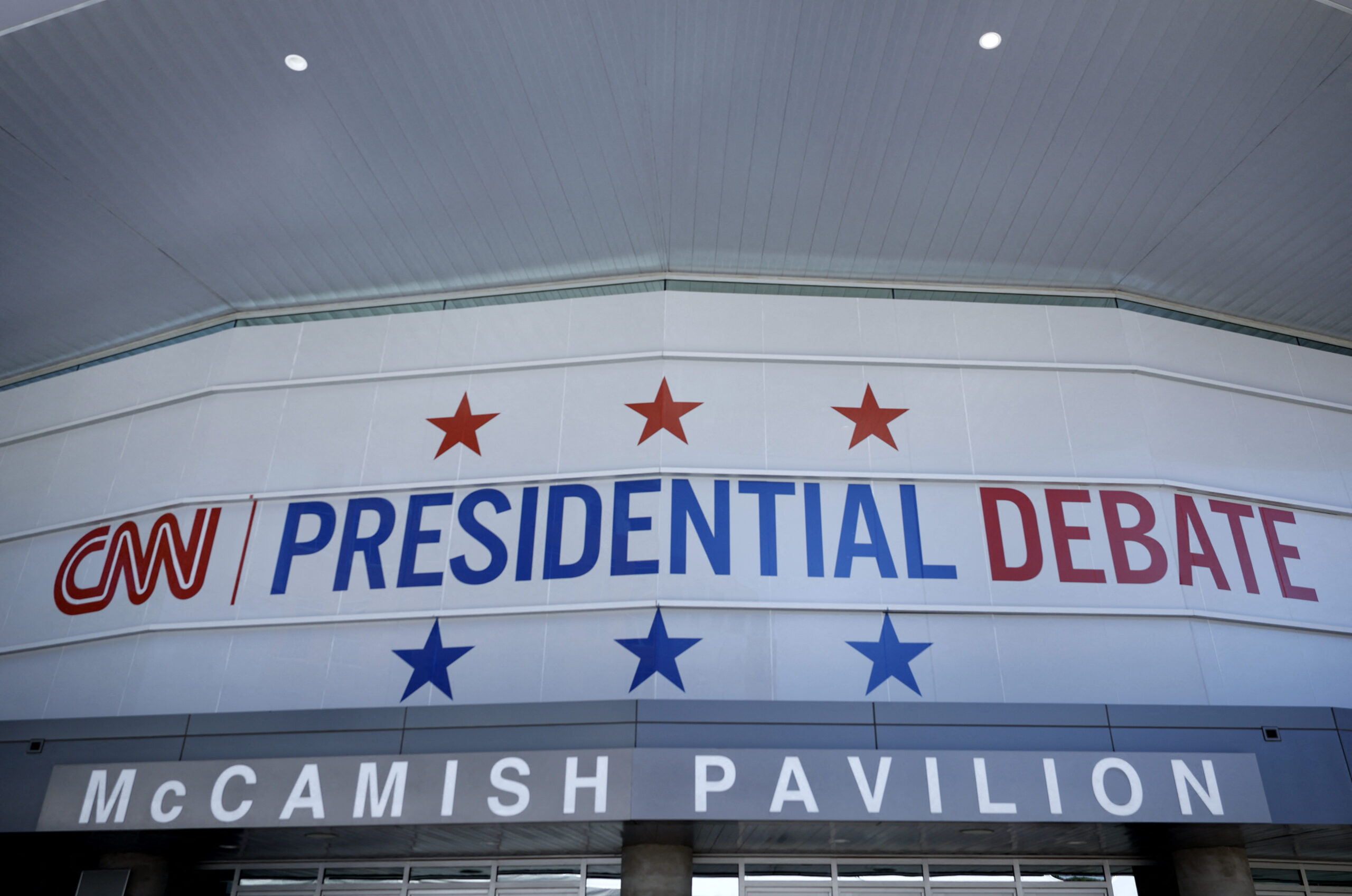
Signs advertising the CNN presidential debate are seen on the McCamish Pavilion on the campus of Georgia Tech on June 25, 2024 in Atlanta, Georgia. U.S. President Joe Biden and Republican presidential candidate former President Donald Trump will face off in the first presidential debate of the 2024 presidential cycle this Thursday. Agence France-Presse
WASHINGTON — Ahead of their first presidential debate, Joe Biden and Donald Trump are offering sharply different visions of the US role in the world, both in style and substance.
The rare matchup between a current and former president puts their stark contrasts on display. Trump during his 2017-2021 presidency vowed to put “America First,” with a combative and often isolationist view of the world, while Biden took office in 2021 vowing “America is Back,” rekindling relationships with allies.
The two presidents have some core beliefs in common. Both were adamant on pulling US troops out of Afghanistan, seeing America’s longest war as not worth the cost to American blood and treasure.
READ: Trump and Biden do battle in first US presidential debate
But the two criticized each other on the implementation, in line with their strong public disagreements on most issues.
Russia and Ukraine
Biden has spearheaded international efforts to support Ukraine after Russia invaded the neighboring country — in defiance of his direct warnings — in February 2022.
With Biden’s encouragement, the US Congress has approved $175 billion in support for Ukraine, including weapons and budgetary support. Biden paid a surprise visit to Kyiv last year and has branded Russian President Vladimir Putin a “brutal tyrant.”
Trump has voiced skepticism over aid to Ukraine, saying he expects Russia to win, and his supporters in Congress held up the last military package to Kyiv for months.
READ: Biden-Trump sequel: US’s first presidential rematch since 1956
Trump has boasted of quickly ending the war. His advisors have spoken of pushing a ceasefire, perhaps by warning Ukraine that aid will dry up unless it compromises on its borders — a suggestion adamantly rejected by Biden, who says only Ukraine should determine its future.
Trump has previously voiced admiration for Putin and was impeached as president for the first time over delaying military aid to Ukraine as he pressed President Volodymyr Zelensky to dig up dirt on Biden’s family.
Middle East
Trump during his presidency was a staunch supporter of Israel, taking landmark steps such as moving the US embassy to Jerusalem, which Palestinians also want as their future capital.
Trump has charged that Biden has “abandoned” Israel. Biden, however, has long cast himself as a defender of Israel and has come under fire from the left of his Democratic Party over his support, including weapons and vetoes at the UN Security Council.
Biden has nonetheless clashed with Prime Minister Benjamin Netanyahu over Palestinian civilian casualties and froze one weapons shipment that included heavy 2,000-pound bombs.
While Trump would be expected to be more hawkish, he has also criticized Netanyahu, faulting him for not preventing the October 7 Hamas attack, in a bitterness tied to Netanyahu’s prompt recognition of Biden’s 2020 election victory.
Trump and his son-in-law, Jared Kushner, late in his term reached the “Abraham Accords” in which the United Arab Emirates, Bahrain and Morocco normalized ties with Israel — the first new Arab recognition in decades.
Biden’s top diplomat, Antony Blinken, has claimed progress on sealing an even greater prize — Saudi Arabia. But the Biden administration faults Trump for backing Netanyahu in sidestepping the Palestinian issue in the push for Arab recognition of Israel.
Biden has also accused Trump of worsening Iran’s nuclear program by withdrawing from a deal negotiated under former president Barack Obama.
Trump counters that the accord was not strong enough, and Biden largely gave up on reviving it.
China, N.Korea and allies
Both Trump and Biden have described China as the top long-term rival of the United States and have worked to counter Beijing, but they have set different tones.
Biden in some areas has taken tougher action against China, including imposing a sweeping ban on semiconductor exports, but has also spoken of keeping competition from veering into conflict and cooperating in select areas such as climate change. Biden held a cordial summit last year with President Xi Jinping.
Trump has described China as an enemy and vowed to ramp up tariffs sharply. But Trump has also insisted that Xi is a “good friend.”
Trump has often praised authoritarian leaders, saying he “fell in love” with North Korean strongman Kim Jong Un. Trump met Kim three times — unusually personal diplomacy that reduced tension but brought no lasting agreement.
Trump in turn has lashed out at Western democratic allies that he sees as benefiting unfairly from the United States.
On the campaign trail, he suggested he would encourage Russia to “do whatever the hell they want” if NATO allies do not “pay (their) bills” — a reference to military spending.
Words that could not be more different than those of Deputy Secretary of State Kurt Campbell: “If you ask me what would be the ‘Biden Doctrine,’ it would be stepping up partnerships with allies and friends.”